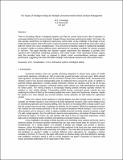The Impact of Intelligent Aiding for Multiple Unmanned Aerial Vehicle Schedule Management
Author(s)
Cummings, M. L.; Brzezinski, A. S.; Lee, J. D.
DownloadDraft version (270.2Kb)
Metadata
Show full item recordAbstract
There is increasing interest in designing systems such that the current many-to-one ratio of operators to unmanned vehicles (UVs) can be inverted. Instead of lower-level tasks performed by today’s UV teams, the sole operator would focus on high-level supervisory control tasks. A key challenge in the design of such single-operator systems will be the need to minimize periods of excessive workload that arise when critical tasks for several UVs occur simultaneously. Thus some kind of decision support is needed that facilitates an operator’s ability to evaluate different action alternatives for managing a multiple UV mission schedule in real-time. This paper describes two decision support experiments that attempted to provide UAV operators with multivariate scheduling assistance, with mixed results. Those automated decision support tools that provided more local, as opposed to global, visual recommendations produced superior performance, suggesting that meta-information displays could saturate operators and reduce performance.
Date issued
2007Publisher
IEEE Intelligent Systems
Citation
Cummings, M.L, Brzezinski, A.S., & Lee, J.D., The Impact of Intelligent Aiding for Multiple Unmanned Aerial Vehicle Schedule Management, IEEE Intelligent Systems: Special issue on Interacting with Autonomy, Vol. 22(2) p.52-59, 2007.
Keywords
Visualization, Interactive systems, Intelligent aiding